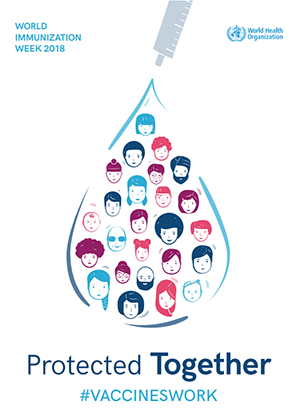 22 April 2018, Cairo – This year’s World Immunization Week campaign, celebrated from 24 to 30 April, aims to highlight that protecting entire communities with vaccines protects everyone and so the theme of this year’s campaign is “Protected Together, #VaccinesWork”.
22 April 2018, Cairo – This year’s World Immunization Week campaign, celebrated from 24 to 30 April, aims to highlight that protecting entire communities with vaccines protects everyone and so the theme of this year’s campaign is “Protected Together, #VaccinesWork”.
Immunization is one of the most successful and cost-effective health interventions. Studies show that every US$ 1 spent on childhood immunization returns US$ 44 in economic and social benefits.
Immunization protects everyone – from infants to senior citizens – against disabling illnesses, disability and death from vaccine-preventable diseases. Increasingly, adolescents and adults are experiencing the benefits of vaccination against life-threatening diseases, such as hepatitis, influenza, meningitis and cancers that occur in adulthood. Every year, immunization prevents up to 3 million deaths from diphtheria, tetanus, pertussis (whooping cough) and measles in all age groups.
It is predicted that increasing vaccine coverage in low- and middle-income countries by 2030 could prevent 24 million people from falling into poverty due to health expenses.1
As World Immunization Week is marked worldwide, it is an opportune time to reflect on some major achievements. The world has seen an 84% reduction in measles deaths between 2000 and 2016 due to measles vaccination. As a result of continued immunization campaigns, polio cases have decreased by over 99% since 1988, and today, only 3 countries (Afghanistan, Nigeria and Pakistan) remain polio endemic, down from more than 125 countries in 1988. During 2016, 116.5 million infants worldwide received 3 doses of diphtheria-tetanus-pertussis (DPT3) vaccine, protecting them against these infectious diseases that can cause serious illness and disability.
Despite this progress, an estimated 19.5 million infants worldwide are still missing out on basic vaccines and vaccination coverage has stalled at 86%, with no significant change during the past year.
In the Eastern Mediterranean Region, the unprecedented magnitude and scale of emergencies is hampering immunization efforts and placing constraints on vaccination outreach campaigns, particularly to besieged and displaced populations, yet WHO and Member States have maintained and expanded immunization coverage across the Region.
“Several countries in the Region, including some affected by emergencies have succeeded in maintaining strong immunization programmes. Latest estimates indicate that the regional average of DTP3 vaccination coverage was at 80%. Yet much remains to be done as unfortunately an estimated 3.7 million children missed their DTP3 in 2016, 92% of whom were in six countries affected by emergencies,” said Dr Jaouad Mahjour, acting WHO Regional Director for the Eastern Mediterranean.
On a more positive note, the uptake of new and underused vaccines, such as Haemophilus influenzae type b (Hib), measles, hepatitis B vaccine for infants, human papillomavirus vaccine and MenAfriVac (meningitis A), is increasing globally and in the Region.
On the occasion of World Immunization Week 2018, WHO praises frontline vaccinators and their role in combating deadly diseases to ensure that people remain protected. Health workers’ efforts to increase immunization strengthens the foundation for strong primary health care and is a route toward universal health coverage. In 2016 alone, health workers immunized more than 62 million children in the world’s lowest income countries, which equated to over 185 million points of contact between these children and the primary health care system.
WHO also appreciates international and regional donors and calls on them to continue to invest in immunization and vaccines as one of the world’s most cost-effective health interventions.
Dr Mahjour reiterates that World Immunization Week should remind all of us of our responsibility in taking action to bring the benefits of immunization to all. “National governments are committed to immunization, and a great deal of support is available from several partners, especially from Gavi, the Vaccine Alliance, for eligible countries. The necessary strategies and tools are available. Let us all use these major opportunities to maximize our efforts and achieve our immunization goals”.
_______________________________________________
1 Chang, Angela Y., et al. “The Equity Impact Vaccines May Have On Averting Deaths And Medical Impoverishment In Developing Countries,” Health Affairs 37.2 (2018).




